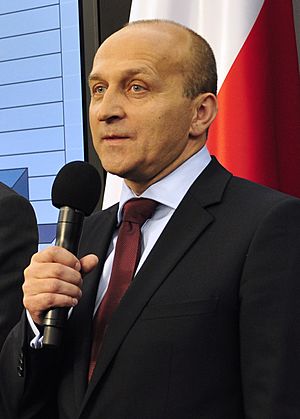Kazimierz Marcinkiewicz facts for kids
Quick facts for kids
Kazimierz Marcinkiewicz
|
|
|---|---|

Marcinkiewicz in 2011
|
|
| Prime Minister of Poland | |
| In office 31 October 2005 – 14 July 2006 |
|
| President | Aleksander Kwaśniewski Lech Kaczyński |
| Deputy | Ludwik Dorn Zyta Gilowska Roman Giertych Andrzej Lepper |
| Preceded by | Marek Belka |
| Succeeded by | Jarosław Kaczyński |
| Mayor of Warsaw | |
|
Acting
|
|
| In office 20 July 2006 – 2 December 2006 |
|
| Preceded by | Mirosław Kochalski (Acting) |
| Succeeded by | Hanna Gronkiewicz-Waltz |
| Member of the Sejm, III, IV and V | |
| In office 20 October 1997 – 18 July 2006 |
|
| Personal details | |
| Born | 20 December 1959 Gorzów Wielkopolski, Poland |
| Political party | Law and Justice (2001–2007) |
| Other political affiliations |
European Coalition (2019) |
| Spouses |
Maria Marcinkiewicz
(m. 1981; div. 2009)Izabela Olchowicz
(m. 2009; div. 2018) |
| Profession | Physicist |
| Awards | |
Kazimierz Marcinkiewicz (born 20 December 1959) is a Polish politician. He served as the Prime Minister of Poland from October 2005 to July 2006. He was a member of the Law and Justice party.
Contents
Early Life and Education
Kazimierz Marcinkiewicz was born in Gorzów Wielkopolski, Poland. He studied physics at the Wrocław University and graduated in 1984. He also completed a special course in Administration at the Adam Mickiewicz University in Poznań.
Before becoming a well-known politician, he worked as a teacher. He was an elementary school teacher and a headmaster in his hometown of Gorzów Wielkopolski.
Early Political Involvement
In the 1980s, Mr. Marcinkiewicz was part of the Solidarity movement. This was a big social and political movement in Poland. He also helped edit underground newspapers during that time.
In 1992, he became a State Secretary in the Ministry of National Education. This role is similar to a deputy minister. From 1999 to 2000, he worked as the cabinet chief for Prime Minister Jerzy Buzek.
Becoming Prime Minister of Poland
In September 2005, the Law and Justice party won the Polish parliamentary elections. The party leader, Jarosław Kaczyński, decided not to become prime minister. This was to help his twin brother, Lech Kaczyński, in the upcoming presidential election.
Instead, Kazimierz Marcinkiewicz was chosen to be the Prime Minister. He led a government formed by Jarosław Kaczyński. At first, many people did not know much about Marcinkiewicz. However, he quickly became very popular in Poland.
Policies and Resignation
Marcinkiewicz strongly supported Poland being a member of the European Union (EU). He believed in Poland's role in the EU. His government continued the economic policies of earlier governments.
He resigned from his position on 7 July 2006. He was then succeeded as prime minister by Jarosław Kaczyński.
After Being Prime Minister
After leaving the prime minister's office, Marcinkiewicz took on new roles. On 18 July 2006, he was appointed as the temporary acting mayor of Warsaw. This meant he was in charge of the city for a short time.
Warsaw Mayoral Election
In the 2006 municipal elections, he ran for mayor of Warsaw. In the first round of voting, he received 38.42% of the votes. His main opponent, Hanna Gronkiewicz-Waltz, received 34.15%. In the second round, held on 26 November, he received 46.82% of the votes but lost the election.
International Roles
From March 2007 to May 2008, he worked as one of the directors at the European Bank for Reconstruction and Development. This bank helps countries in Europe and Asia develop their economies.
Later, from 2008 to 2013, he worked for Goldman Sachs, a large financial company.
Famous Quote
Kazimierz Marcinkiewicz became famous for his enthusiastic phrase "Yes, yes, yes!" This happened after successful negotiations for the EU budget on 17 December 2005. This phrase became a symbol of political success in Polish popular culture. It showed real emotions and confidence.
Famous Quotes
Kazimierz Marcinkiewicz became famous for an excited phrase he used. After successful talks about the EU budget on 17 December 2005, he exclaimed, "Yes, yes, yes!"
This phrase became well-known in Polish culture. It symbolized a political success that showed real emotions. It also became a symbol of strong self-confidence. The car company Volkswagen even used a similar phrase in one of its advertisements.
See also
 In Spanish: Kazimierz Marcinkiewicz para niños
In Spanish: Kazimierz Marcinkiewicz para niños
- History of Poland (1989–present)
- List of Law and Justice politicians
 | William L. Dawson |
 | W. E. B. Du Bois |
 | Harry Belafonte |

